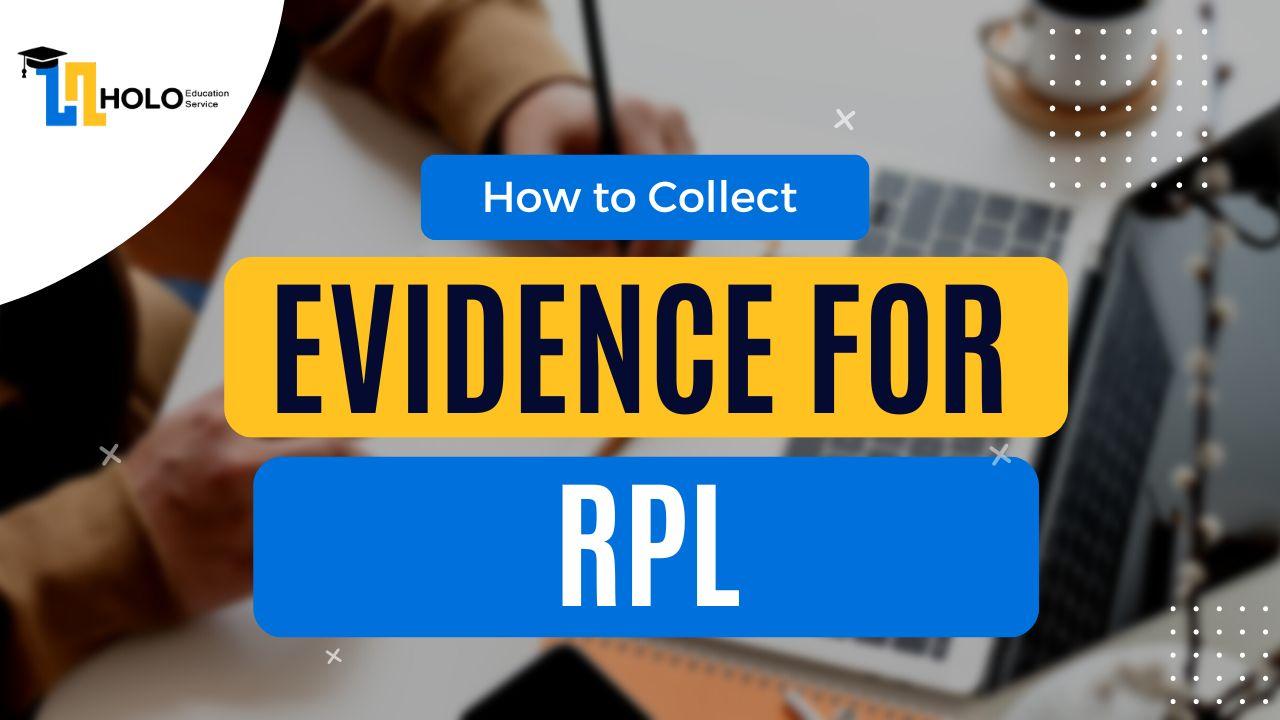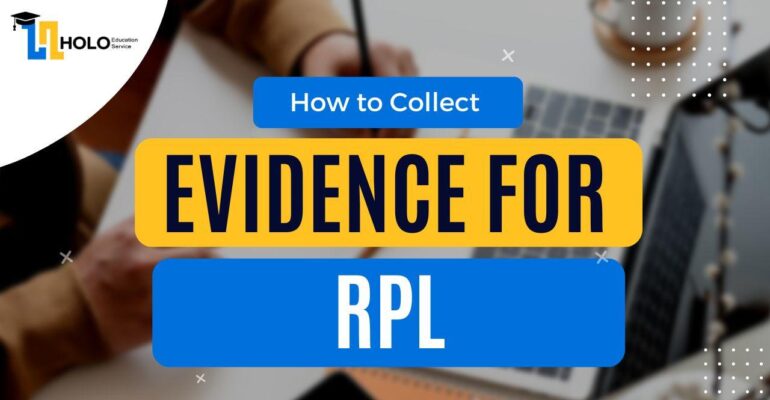How to Collect Evidence for RPL
May 5, 2023 2023-05-05 7:29How to Collect Evidence for RPL

Recognition of Prior Learning (RPL) is a valuable pathway for individuals who want to gain formal qualifications based on their existing skills, knowledge, and experience. One of the critical components of the RPL process is collecting evidence to support the competencies being claimed.
Collecting evidence is a vital part of the RPL process as it allows assessors to evaluate an individual’s competency levels against the requirements of a particular qualification or unit of competency. In this blog, we will discuss some tips for collecting evidence for RPL.
- Identify the relevant competencies: The first step in collecting evidence for RPL is identifying the relevant competencies required for the qualification or unit of competency. This will help you focus on collecting evidence that demonstrates your proficiency in those areas.
- Understand the evidence requirements: Each RPL application will have specific evidence requirements that need to be met. It’s essential to understand what type of evidence is required, the format it should be in, and the minimum amount of evidence required.
- Gather evidence from different sources: Evidence can be collected from a variety of sources, including work experience, training programs, certificates, awards, and references. It’s essential to collect evidence from a range of sources to demonstrate your proficiency across different contexts.
- Use specific examples: When collecting evidence, it’s essential to use specific examples that demonstrate your competency. This could be a project you worked on, a report you prepared, or a task you completed. The more specific the example, the better it will demonstrate your proficiency.
- Ensure evidence is up-to-date: Evidence collected for RPL should be recent and up-to-date. Assessors need to be confident that you still possess the relevant competencies, and that the evidence is not outdated.
- Provide context: When submitting evidence, it’s important to provide context around the evidence. This could include the purpose of the task, the scope of your responsibilities, and the challenges faced during the task.
- Organise evidence logically: It’s essential to organise evidence logically and in a way that makes it easy for the assessor to review. This could be done by grouping evidence by competency, date, or source.
- Seek guidance: If you’re unsure about what evidence to collect or how to collect it, seek guidance from a qualified RPL assessor. They can provide you with advice and support to help you collect the evidence you need.
In summary, collecting evidence is a critical part of the RPL process. By following these tips, you can ensure that you collect relevant, up-to-date evidence that demonstrates your competency across different contexts. Remember to seek guidance from a qualified RPL assessor if you’re unsure about any aspect of the evidence collection process.
Search
Categories
- 10 Tips for International Students to Adapt to Studying in Australia (1)
- 2023 (1)
- A Comprehensive Guide to Certificate II in Community Pharmacy SIR20116 (1)
- A Guide for Fitness Professionals (1)
- AUR30620 – Certificate III In Light Vehicle Mechanical Technology (1)
- Australia: The Ultimate Study Destination for International Students (1)
- Balancing Work and Study as an International Student in Australia (1)
- BSB50320 Diploma of Human Resource Management (1)
- BSB50420 – Diploma of Leadership and Management (1)
- Celebrating Western Australia Day (1)
- Certificate IV in Disability (1)
- CHC30121 – Certificate III in Early Childhood Education and Care (1)
- CHC33015 – Certificate III in Individual Support (1)
- CHC43015 Certificate IV in Ageing Support (1)
- CHC43115 – Certificate IV in Disability (1)
- CHC43115- Certificate IV in Disability (1)
- CHC43315 Certificate IV in Mental Health (1)
- CHC50121 Diploma of Early Childhood Education and Care (1)
- CHC51015-Diploma-of-Counselling- (1)
- CHC52015 – Diploma of Community Services (1)
- Childcare Subsidies in Australia (1)
- Choosing the Right Australian University: Factors to Consider (1)
- CPC30220 Certificate III in Carpentry (1)
- CPC30620 – Certificate III in Painting and Decorating (1)
- CPC40120 Certificate IV in Building and Construction (1)
- FNS40222 Certificate IV in Accounting and Bookkeeping (1)
- Healthcare and Insurance in Australia for International Students (1)
- HOLO EDUCATION SERVICES (23)
- How to Collect Evidence for RPL (1)
- Navigating RPL Success: Avoiding Common Mistakes in Your RPL Application (1)
- SHB50121 – Diploma of Beauty Therapy (1)
- SIT30816 Certificate III in Commercial Cookery (1)
- SIT40516 certificate IV in commercial cookery (1)
- SIT50416 Diploma of Hospitality Management (1)
- SIT60322 Advanced Diploma of Hospitality Management (1)
- TAE40116 Certificate IV in Training and Assessment (1)
- The Australian Education System (1)
Latest Posts
Popular Tags
#CareerAdvancement
#CareerGrowth
#CareerSuccess
#DigitalEducation
#FlexibleLearning
#LifelongLearning
#ProfessionalDevelopment
#SkillDevelopment
#StudyInAustralia
Albanese Government
australia
best rpl australia
career advancement
Career Development
career opportunities
career prospects
Certificate
Certificate IV in Disability
Certificate III
CHC43115 - Certificate IV in Disability
compliance
curriculum
Disability Care
Disability Support
education
Education and Training
Empowerment
FutureSuccess
healthcare
Healthcare Careers
healthcare services
HoloEducation
Holo Education Services
international students
Palliative Care
professional development.
professional growth
Recognition of Prior Learning
RecognitionOfPriorLearning
rpl
RPL certification
Salon Operations
Success in Beauty Industry
vocational education
well-being






